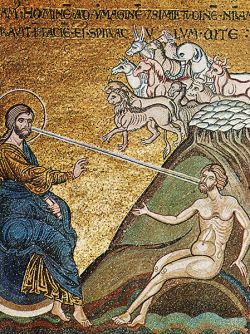Research project and scientific committee
Man — Custodian of Creation
XX International Ecumenical Conference
in collaboration with the Orthodox Churches
XX International Ecumenical Conference
on Orthodox Spirituality
Bose, Wednesday 5 - Saturday 8 September 2012
in collaboration with the Orthodox Churches
According to the Bible, God in his Word created the universe and saw that his creation was good; he formed man according to his image and likeness and saw that it was “very good” (Gen 1,31). Man’s fall disturbs also the harmony of creation and human relations. The Bible lifts the veil on the mystery of visible creation in placing it in relation to salvation history, when with Paul it affirms that the world groans in labor pangs awaiting final salvation (cf. Rom 8, 22). The incarnation of the Son, his cross, his resurrection, and the gift of the Holy Spirit restore wounded man and the universe; the new humanity in Jesus Christ, with the free obedience of faith, can thus fulfill God’s plan of salvation and responsibly govern the creation that was entrusted to it.
The 20th International ecumenical conference on Orthodox spirituality hopes to examine more closely this fundamental tie between creation and salvation by interrogating and being interrogated by the various Orthodox traditions.
With great discernment the Orthodox Churches have been able to arouse awareness that man’s responsibility for all creation is inscribed in God’s commandment. Patriarch Bartholomew I of Constantinople, following an intuition of his predecessor Demetrios, from the beginning of his patriarchate has forcefully promoted initiatives for the safeguarding of creation and has emphasized the spiritual and Christian dimension of ecological commitment.
Although ecology is a recent science, its spiritual foundations have ancient roots. Creation is a book that recounts Gods glory and mercy. The fathers meditated on the Biblical account of creation, but also dealt with the scandal of evil and of suffering and contrasted divine providence to astrological fatality. Maximus the Confessor in the seventh century examined man’s vocation within creation and his renewed vocation in Christ. The spiritual tradition, thus, has been able, through the purification of the heart, to discern the traces of the Creator Word in the natural world, to the point of contemplating the world immersed in divine light.
What does this way of looking at creation teach us today?
Monks and nuns have often sought solitude in surroundings that were inhospitable: the desert and the forest populated by savage beasts. What do saints’ lives teach us about stillness in the heart of a man of God who spreads peace around him? How and why have monks in both East and West worked to develop harsh natural surroundings so as to make them fit for prayer and work?
Monastic asceticism is a manifestation of the asceticism and sobriety that by baptism is required of every Christian. What do asceticism and poverty teach us today in a society of consumers, us who are often incapable of respecting the earth that gives us a home, of sharing its gifts with all men?
Liturgical celebration intimately includes the cosmos in the Church’s praise and adoration. Everything that lives and breathes, everything that exists, trees, stones, the sun and the moon, praise the Lord. Above all, the eucharistic celebration is a sacrifice of praise offered to the Father, in which the assembly of believers draws all of creation and all human history after it.
How can this great spiritual wealth be translated today into an ethics of creation? How can contemporary Orthodox theology respond to the challenges that derive today from technology and science?
All this leads us in conclusion to pose a fundamental question: how to speak to day about creation.
SCIENTIFIC COMMITTEE:
Enzo Bianchi (Bose)
Lino Breda (Bose)
Sabino Chialà (Bose)
Lisa Cremaschi (Bose)
Hervé Legrand (Parigi)
Adalberto Mainardi (Bose)
Antonio Rigo (Venezia)
Luigi d'Ayala Valva (Bose)
Michel Van Parys (Chevetogne)
